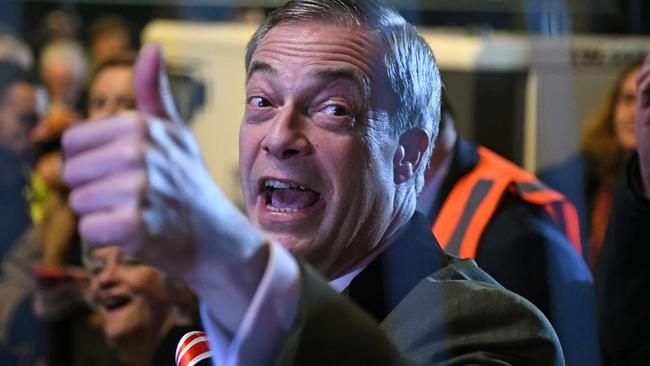Bank licences at risk if UK customers dumped over views
British banks risk having their licences stripped from them if they dump customers because of their political views.

British banks risk having their licences stripped from them if they dump customers because of their political views under a crackdown aimed at protecting freedom of speech.
The move by the British government to make the right to free speech a condition of banking permits follows a decision by Coutts – the bank of choice for the royal family – to close the accounts of Nigel Farage because his right-wing views did not “align with our values”.
In the wake of an uproar over Coutts’ treatment of the former leader of the UK Independence Party (Ukip), banks will also be required to give an “explicit” reason for closing accounts, and customers will have the right to appeal.
A government source told The Times that people’s right to express their views was sacrosanct. The source added that ministers believed “sunlight is the best disinfectant” and greater transparency would force banks to change their ways.
Coutts was condemned by ministers on Wednesday (Thursday AEST) for its decision to close Mr Farage’s accounts after an internal review referred to him as a “disingenuous grifter” whose views could be regarded as “xenophobic and racist”.
“This is wrong. No one should be barred from using basic services for their political views. Free speech is the cornerstone of our democracy,” Prime Minister Rishi Sunak said. Home Secretary Suella Braverman accused the banks of “politically biased dogma” bordering on “sinister”.
The BBC had reported Coutts closed Mr Farage’s accounts because he did not have enough money. However, a 40-page dossier obtained by Mr Farage from the bank states the decision was made because of his views.
The dossier included the minutes from a November 17, 2022, meeting when the Coutts wealth reputational committee settled on cancelling Mr Farage’s accounts.
“The committee did not think continuing to bank NF (Nigel Farage) was compatible with Coutts given his publicly stated views that were at odds with our position as an inclusive organisation,” the report says. “While it is accepted that no criminal convictions have resulted, commentary and behaviours that do not align to the bank’s purposes and values have been demonstrated.”
Andrew Griffith, the economic secretary to the Treasury, has asked officials for advice on legislation to protect free speech, with the focus now on inserting those protections into banking licences.
“It would be of serious concern if financial services were being denied to anyone exercising their right to lawful free speech,” he said. “Businesses have the right to protect against reputational risks, eg criminal activity, but the privilege of a banking licence in a democracy should imply a duty not to ‘debank’ because you disagree with someone’s views.”
Mr Farage is threatening to take legal action against Coutts over claims his accounts were closed for financial reasons. He did not dispute that his finances fell below the Coutts threshold of £3m ($5.68m) in savings or £1m in loans or investment, but said that had not been an issue in the past.
Mr Farage told The Times that he had been informed that an individual at NatWest, which owns Coutts, was behind the briefing to the BBC. He said Dame Alison Rose, the chief executive of NatWest, had “questions to answer”.
“I am told that the briefing given to the BBC about my personal finances – and I question whether it was ethical or legal to do so – was given by NatWest,” he told The Times.
“This is not just about Coutts, this is about the whole banking group. Ultimately in any organisation the fish rots from the head down. Alison Rose has questions to answer.”
Mr Farage was one of the leaders of the Brexit campaign and on Thursday it emerged that Coutts’ managing director and head of private clients, Camilla Stowell, had pushed for Britain to remain in the EU and believed Brexit had damaged the economy.
Ms Stowell was asked last year whether there needed to be a “conversation in respect of Brexit” and the economy. She replied: “Personally, I was a Remainer. So I fear that, yes, we know that Brexit is having an impact.”
Mr Farage told London’s Daily Telegraph that it was unwise for a banking executive to reveal how they had voted in the EU referendum and that he believed the opinions expressed by Ms Stowell were reflected in the bank’s report on him.
“That report had a special kind of prejudice that you could only get from upper middle-class white living in London,” he said.
“It’s a twisted sense of priorities, it is absolutely metropolitan elite prejudice.”
Conservative MP David Davis said NatWest’s conduct “ought to jeopardise” its banking license and worry its 19 million customers. He also asked Mr Sunak to force every British bank to inform the government of all accounts cancelled for non-commercial reasons.
NatWest and the BBC declined to comment. Coutts issued a statement saying: “It is not Coutts’ policy to close accounts solely on the basis of legally held views. Decisions are not taken lightly and involve a number of factors, including commercial viability, reputational considerations and legal requirement.”
It added Mr Farage had been offered a NatWest account.
AGENCIES



To join the conversation, please log in. Don't have an account? Register
Join the conversation, you are commenting as Logout